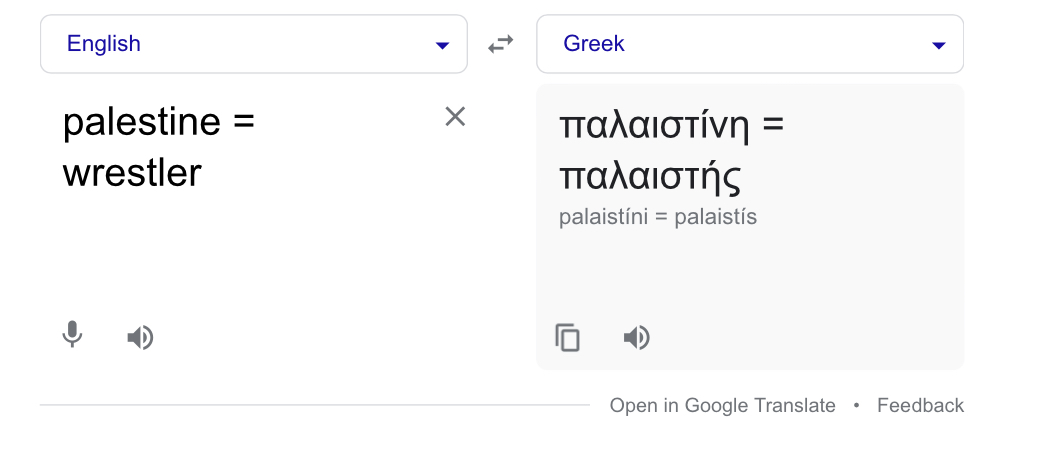Who are the Original Indigenous people of Israel ? 🇮🇱

Jacob (Israel) wrestles with God.
“Palestine” is the Greek word for One Who Wrestles… a direct translation of the Hebrew Word “Israel”

Scholars agree that the Philistines were of Greek origin, and that they came from Crete and the rest of the Aegean Islands or, more generally, from the area of modern-day Greece.
The Philistines originated as an immigrant group from the Aegean 🇬🇷 that settled in Canaan circa 1175 BCE. Over time, they gradually assimilated elements of the local Levantine societies while preserving their own unique culture.
παλαιστίνη = παλαιστής
palaistíni = palaistís
Philistines: https://en.wikipedia.org/wiki/Philistines
Palestine : https://en.wikipedia.org/wiki/Timeline_of_the_name_Palestine
Israel : https://en.wikipedia.org/wiki/Israel
The name 'Israel' (Hebrew: Yisraʾel, Isrāʾīl; Septuagint Greek: Ἰσραήλ, Israēl, 'El (God) persists/rules', though after Hosea 12:4 often interpreted as 'struggle with God') in these phrases refers to the patriarch Jacob who, according to the Hebrew Bible, was given the name after he successfully wrestled with the angel of the Lord. Jacob's twelve sons became the ancestors of the Israelites, also known as the Twelve Tribes of Israel or Children of Israel. Jacob and his sons had lived in Canaan but were forced by famine to go into Egypt for four generations, lasting 430 years, until Moses, a great-great-grandson of Jacob, led the Israelites back into Canaan during the "Exodus". The earliest known archaeological artefact to mention the word "Israel" as a collective is the Merneptah Stele of ancient Egypt (dated to the late 13th century BCE).
Israel (Hebrew: יִשְׂרָאֵל, Modern: Yīsraʾel, Tiberian: Yīsrāʾēl) is a masculine given name of Hebrew origin. According to the Book of Genesis, Jacob was given the name Israel after he wrestled with the angel (Genesis 32:28 and 35:10). The given name is attested in Eblaite (𒅖𒊏𒅋, išrail) and Ugaritic (𐎊𐎌𐎗𐎛𐎍, yšrʾil).
The text of Genesis etymologizes the name with the root śarah "to rule, contend, have power, prevail over":] שָׂרִיתָ עִם־אֱלֹהִים (KJV: "a prince hast thou power with God"), but modern suggestions read the el as the subject, for a translation of "El/God rules/judges/struggles",] "El fights/struggles".
The name appears on the Merneptah Stele as 𓇌𓊃𓏤𓏤𓂋𓇋𓄿𓂋𓏤 (ysrỉꜣr), referring to the Israelites. In Jewish and Christian texts from the Greco-Egyptian area during Second Temple Judaism and beyond the name was understood to mean "a man seeing God" from the ʾyš (man) rʾh (to see) ʾel (God).
Jacob's descendants came to be known as the Israelites, eventually forming the twelve tribes of Israel and ultimately the kingdom of Israel, whence came the name of modern-day State of Israel.
All true, but today's "palestinians" are actually Arabs (from the Arabian peninsula) who came to the land of Israel in the late 1800s and early 1900s after the first Zionistic Jews returned to their land and started to return prosperity to the land.
They really have nothing to do with the ancient Philistines (who were Greek) and Jews living in the land of Israel called themselves palestinians too (because they also lived in the Palestine Mandate) up until the State of Israel was declared in 1948. The Jerusalem Post was originally the Palestine Post.
The Palestine Liberation Organisation (PLO) was established in 1964. Before that there was no separate palestinian Arab identity - they just considered themselves Arabs living in the Palestine Mandate.
Yes, the word Palestine is a Greek word that means “one who wrestled”.
A direct translation from the Hebrew Word “ Israel” ….